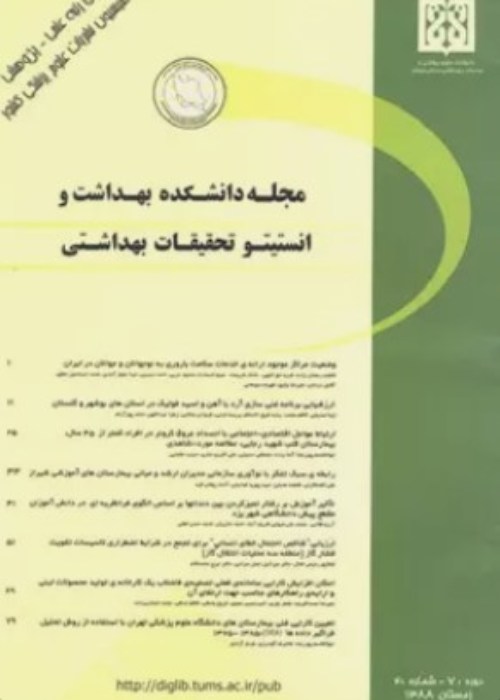RAPID ASSESSMENT OF THE MENTAL HEALTH SERVICE DELIVERY TO SURVIVORS OF BAM EARTHQUAKE
Author(s):
Abstract:
Natural disasters cause millions of death and disability and major financial losses world wide every year. The major concern of our health system has already been to reduce physical mortality and morbidity. While such events may be a considerable source of stress for the survivors and cause serious and long-lasting psychiatric complications. The purpose of this study was to assess the function of rescuers in mental health service delivery to survivors of Bam earthquake in four steps; Rescuing, Emergency services, Transportation of the injured survivors and Treatment in the first 2 weeks after the earthquake. For reaching the purpose 4 groups of the survivors were selected: first group was the healthy survivors (>15 years) living in Bam after the earthquake, the second group was healthy survivors (<15 years) living in Bam after the earthquake, the third group was the injured survivors admitted in Kerman and Tehran hospitals and the last group was the Relatives who accompanied the injured survivors. 2 weeks after the earthquake a questionnaire including questions about, demographic data, function of rescuers in rescuing and emergency services steps, informing the survivors of their relatives condition and Condoling with the survivors and mental health services delivery was filled for each of the cases. In all groups, more than 85% of the cases who needed help and rescued from the load of the earthquake were rescued by their relatives and rescuers of the Red Crescent Society or other governmental organization just had a little portion (5%)in this field. Only 25%of the cases who needed help and rescuing from the load of the earthquake were rescued in the first hour after the earthquake. Only 40% of the cases were sympathized by their rescuers. About 65% of the cases had enough information about their relatives. 40% of the cases were prevented from crying by rescuers. Only 30% of the cases said that they knew addict individuals who were hot given alternative materials. 30/% of the children had played during 2 weeks after earthquake and 42/% of them had facilities for playing. Regarding to all studied groups rescue activities, primary care services and transfers have been performed by relatives and domestic people, therefore general training and organizing CBO (community Based organization) for providing services in disasters especially in regions which are at high risk of earthquake will be useful for reducing the injuries. According to this research rescuers are in serious need of training in mental health services and that major areas of education need are: using counseling techniques, providing the necessary information for the survivors and stress management techniques.
Language:
Persian
Published:
Scientific Journal of School of Public Health and Institute of Public Health Research, Volume:3 Issue: 4, 2006
Pages:
1 to 12
magiran.com/p480958
دانلود و مطالعه متن این مقاله با یکی از روشهای زیر امکان پذیر است:
اشتراک شخصی
با عضویت و پرداخت آنلاین حق اشتراک یکساله به مبلغ 1,390,000ريال میتوانید 70 عنوان مطلب دانلود کنید!
اشتراک سازمانی
به کتابخانه دانشگاه یا محل کار خود پیشنهاد کنید تا اشتراک سازمانی این پایگاه را برای دسترسی نامحدود همه کاربران به متن مطالب تهیه نمایند!
توجه!
- حق عضویت دریافتی صرف حمایت از نشریات عضو و نگهداری، تکمیل و توسعه مگیران میشود.
- پرداخت حق اشتراک و دانلود مقالات اجازه بازنشر آن در سایر رسانههای چاپی و دیجیتال را به کاربر نمیدهد.
In order to view content subscription is required
Personal subscription
Subscribe magiran.com for 70 € euros via PayPal and download 70 articles during a year.
Organization subscription
Please contact us to subscribe your university or library for unlimited access!


